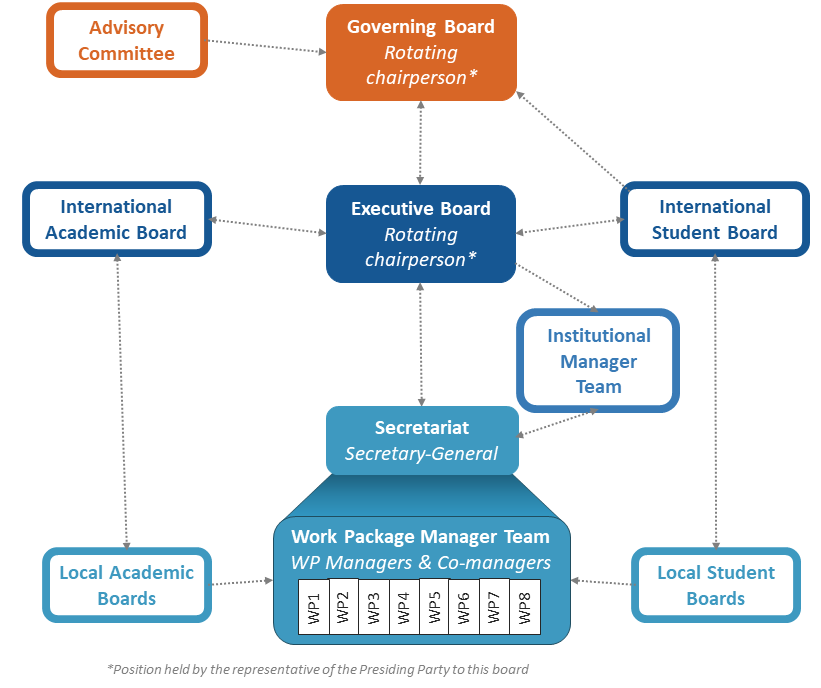
The Alliance’s long-term strategy is pursued within the framework of a shared governance model and joint procedures designed to enable the efficient implementation and monitoring of EUGLOH’s short-, medium- and long-term objectives. This participatory governance model ensures the participation of all members of the academic community, especially students (from all socio-cultural backgrounds, subject areas and degree levels). It also guarantees inclusive and holistic representation in the decision-making processes of the Alliance.

Governance
The governance and management structures of EUGLOH are based on the following goals:
- Smooth integration of new partners into the Alliance, for example via rotating leadership of the Governing Board and International Academic and Student Boards;
- Continuous communication flows between consortium bodies, work packages and member universities;
- Considerations of the needs and objectives of the student and staff bodies as well as external stakeholders;
- Ability to have an agile response to change in the global, regional or local contexts in which the Alliance beneficiaries work, live and learn. In order to achieve these objectives, the EUGLOH Alliance will utilise a shared governance model to enable decision-making, ensure cooperation and facilitate operations for the Alliance and its activities at the strategic, tactical and operational levels.
Governing Board
Responsibilities: The Governing Board is the ultimate decision-making body of the Alliance; it is entitled to consider legal issues and lobbying to or on behalf of the Alliance. It is a decision-making body that takes decisions on the overall strategic orientation and mission of the project, endorsement of the budget and legal issues concerning the consortium
Members: The Governing Board is led by a rotating chair, chosen from among the rectors and presidents of the partner institutions. The board's voting members are the President or Rector of each partner institution. It is advised by a rotating group of three (3) representatives of the International Student Board, by the representatives of the International Academic Board, and by the EUGLOH Coordinator and Secretary-General. Vice-rectors and vice-presidents as well as the Student Coordinator may also attend, among others.
Executive Board
Responsibilities: The Executive Board is the supervisory body for the execution of the Project; it is responsible for making the bridge between strategy and operations for the Alliance and thus has a key role in making its tactical decisions. The Executive Board shall report to and be accountable to the Governing Board.
Members: The Executive Board is led by the Alliance Coordinator, though the Alliance may also initiate a rotating coordination of this body in the future. Its voting members are the Vice-Presidents, Vice-Rectors or their equivalent from each partner institution. They are advised by the International Student and Academic Boards (all members who may attend) and by the Secretary-General. Academic Work Package Leaders, Institutional Managers and Work Package Managers and co-managers may also participate.
Operations
Secretariat
The Secretariat is responsible for ensuring the overall execution of the EUGLOH 2.0 work plan – coordinating the actions of Work Package Managers and co-managers (and through them, their teams) as well as those of the Institutional Managers.
Work package coordination
There are eight work packages, each pursuing different objectives. Every work package has its own coordination team, composed of Work Package Managers and co-managers and guided by Academic Leaders and co-leaders, students, and potentially associated partners. The Work Package Managers and co-managers are in charge of implementing tasks and activities jointly decided by the team. They work with the Secretariat to ensure the overall coordination of the EUGLOH work plan.

Institutional Management
Within each partner institution, there will be an Institutional Manager who will be responsible for implementing the entirety of the EUGLOH work plan within his or her local context. To that end, the Institutional Manager will play a crucial role in the EUGLOH 2.0 project implementation and monitoring, particularly as regards mobility and financial management on behalf of his or her university.
